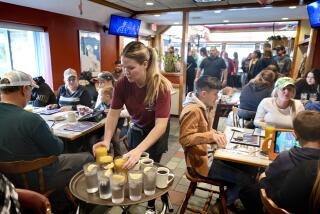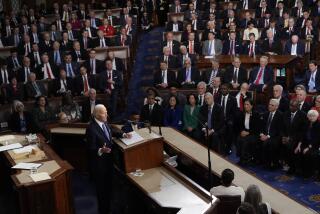Disappointing wage growth adds sobering note to strong jobs report
The surprisingly robust job growth last month showed the economy has healed enough to shake off bad weather, the West Coast ports slowdown and a rising dollar that made U.S. goods more expensive abroad.
But the labor market wasn’t strong enough to produce more than a minor boost to Americans’ wages.
“Clearly that’s the bus that has yet to arrive,” said Mark Hamrick, Washington bureau chief of financial information website Bankrate.com. “There’s a lot to celebrate in this report, but the wage component is quite sobering.”
U.S. employers added 295,000 net new jobs in February while the unemployment rate fell to a post-Great Recession low of 5.5%, the Labor Department said Friday.
The job creation exceeded economists’ forecast of 230,000 jobs.
February’s job growth was an improvement over January’s 239,000, which was revised down Friday by 18,000, and bolstered the expectation that the Federal Reserve would start raising its rock-bottom benchmark interest rate in June.
With a rate hike appearing more certain, the Dow Jones industrial average dropped sharply Friday. It was down about 188 points in mid-session trading.
February was the 12th straight month in which the nation added at least 200,000 net new jobs, the best streak since 1994-95.
Part of the reason the unemployment rate fell to its lowest level since May 2008 was that about 178,000 job-seekers dropped out of the labor force. That caused the labor force participation rate to tick down by a tenth of a percentage point to 62.8%, near a more-than-three-decade low.
“You may quibble over some of the details, but it’s hard to argue over a report that has 295,000 jobs as a headline,” said Gus Faucher, senior economist at PNC Financial Services Group.
Still, economists were disappointed to see wage growth slow significantly last month. Average hourly earnings rose by just 3 cents, or 0.01%, to $24.78 after an encouraging 13-cent increase in January.
For the 12 months ended Feb. 28, wages rose by only 2%. Although that’s well above the low inflation rate, it’s not nearly the level economists would like to see coming out of a deep recession.
“That’s the missing piece of the labor market puzzle: better wage growth,” Faucher said.
Economists keep anticipating its arrival, only to be disappointed.
“I fully expect that as the labor market continues to strengthen, as I hope it will, that wage growth will move up, and Americans will find that they’re getting a raise,” Fed Chairwoman Janet L. Yellen told lawmakers last week. “That would be a symptom of a healthier job market.”
Hopes were lifted after Wal-Mart Stores Inc. announced this month that it would raise the minimum pay for its workers to $9 an hour in April, $1.75 more than the federal minimum wage. Analysts said the move showed more competition for workers.
But that competition still might only be for low-wage jobs, Hamrick said. And increases in pay for those positions don’t boost overall earnings by much.
Friday’s report showed that some of the strongest job growth last month was in lower-paying sectors.
Restaurants and bars added 59,000 net new jobs and retailers increased their payrolls by 32,000.
But analysts said there were some positive signs in the report that fueled expectations that wage growth will pick up this year.
The higher-paying construction industry added 29,000 net new jobs despite bad weather in the Northeast and Midwest. Manufacturing, another good -paying field, boosted payrolls by 8,000.
Some economists pointed to improvements in the Labor Department’s employment cost index, which factors in benefits and other compensation as well as wages. The index was up 0.6% in the fourth quarter of last year, a much faster pace than wage growth.
And workers appear more confident that they can get a better job. The so-called quits rate was 1.9% in December, near its highest level since mid-2008.
------------
FOR THE RECORD
10:25 a.m.: A previous version of this article stated that the so-called quits rate rose to 1.9% in December, its highest level since mid-2008. The highest level was 2% in September.
------------
“I do think we will see better wage growth in 2015,” Faucher said.
And he’s not alone. Economists in Bankrate.com’s quarterly survey forecast average hourly earnings would rise 2.5% this year, which would be a significant improvement over the 2% annual rate through February.
For breaking economic news, follow @JimPuzzanghera on Twitter







